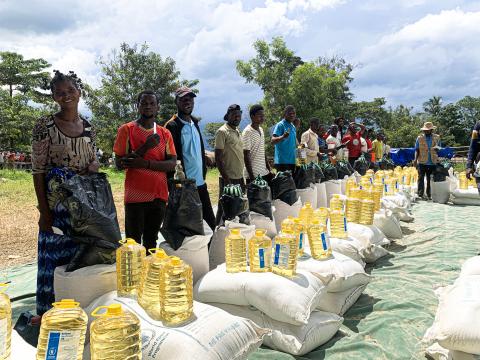DR Congo: Why did 30,000 households receive food aid during the lean season in Kasai?

In several regions of the Democratic Republic of Congo, the lean season, which often lasts from September to November, is marked by a drastic reduction in food stocks. Reserves from the previous harvest are generally depleted, while new seeds have not yet yielded fruit. This food gap exposes vulnerable households to increased risks of hunger and malnutrition, particularly in rural areas. This year, in the Demba territory, located in the province of Kasai-Central, the situation is very alarming. Many families have been on the brink of a food crisis, in a context already weakened by economic and climatic shocks.
Humanitarian response: the GFD project comes to the rescue of households
In response to this situation, the World Food Programme (WFP) and World Vision have launched a large-scale intervention through the General Food Distribution (GFD) project in the health zones of Zapo Zapo, Bena Kayembe and Tshibumgu. More than 30,000 households received essential food items, including cornmeal, beans, vegetable oil and iodised salt, enabling them to meet their food needs during this critical period.
‘This distribution came at just the right time. It enabled thousands of families to get through the lean season without falling into famine,’ explained John Douve, GFD Project Coordinator for World Vision, in an interview with our correspondent on Tuesday, 18 November 2025.
Lives transformed: words from beneficiaries
Having received food supplies, the beneficiaries did not hesitate to pay tribute to the WFP and World Vision, before expressing the importance of this assistance.
‘Thank you to all the partners who thought of us. Thanks to this aid, my children will now eat three times a day: in the morning before school, at noon and in the evening. It's a real relief for my family,’ says Maman Godet, with a big smile on her face.
Support that goes beyond food baskets
The project is not limited to food distribution. It includes awareness-raising on nutritional practices, community follow-ups and close collaboration with local health services to prevent cases of acute malnutrition. More than 30,000 households received essential food items, including cornmeal, beans, vegetable oil, and iodised salt, enabling them to meet their food needs during this critical period.
‘Our goal is to strengthen the resilience of communities so that one day they will no longer need this aid. Each distribution is accompanied by key messages and training to support their future self-sufficiency,’ adds Douve.
As a reminder, Kasaï-Central is one of the provinces most affected by food insecurity in the DRC. Past armed conflicts, massive population displacement, chronic poverty, and low agricultural yields have created fertile ground for malnutrition. According to estimates, more than one million people in this part of the country are facing severe food insecurity. Children under the age of five are the most affected, with several health centres recording cases of moderate and severe acute malnutrition.